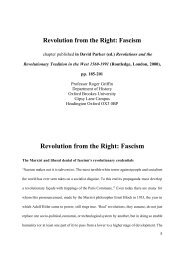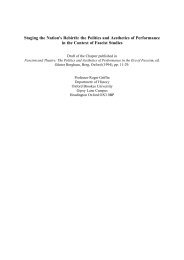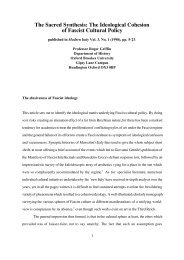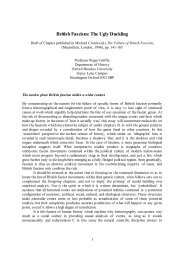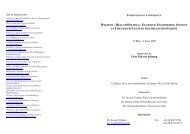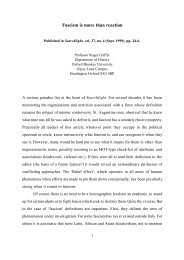The palingenetic core of generic fascist ideology - School of Arts and ...
The palingenetic core of generic fascist ideology - School of Arts and ...
The palingenetic core of generic fascist ideology - School of Arts and ...
Create successful ePaper yourself
Turn your PDF publications into a flip-book with our unique Google optimized e-Paper software.
Endnotes<br />
1. An obvious exception are Italy’s many post-war Marxist academics, who have showed<br />
an unquestioning solidarity with their non-Italian comrades in assuming that Fascism was<br />
part <strong>of</strong> an international wave <strong>of</strong> capitalist reaction. As for non-Italian historians <strong>of</strong><br />
Fascism who are known in Italy, the most famous Denis Mack Smith, denies that either<br />
Mussolini or his movement had a ideological dimension, thus reducing ‘<strong>generic</strong> fascism’<br />
to a figment <strong>of</strong> the social scientific imagination. Significantly, one <strong>of</strong> the most important<br />
fora for debate about foreign theories <strong>of</strong> <strong>generic</strong> fascism which managed to emerge before<br />
the series ‘Fascismo/fascismo’ in which this volume appears was provided not by<br />
academics, but by the protagonists <strong>of</strong> a new, ideologically cohesive <strong>and</strong> sophisticated<br />
‘right wing culture’, notably Diorama letterario. See, for example, no. 31, May-June<br />
1985 dedicated to theories <strong>of</strong> fascism.<br />
2. <strong>The</strong> German academic industry has also operated a ‘closed shop’ when it comes to the<br />
analysis <strong>of</strong> the Third Reich (with the honourable exception <strong>of</strong> Ian Kershaw). This has led<br />
to a situation where generally only Marxists are prepared to designate Nazism a form <strong>of</strong><br />
<strong>generic</strong> fascism: Wolfgang Wippermann’s solitary attempt to popularize the term from<br />
a non-Marxist point <strong>of</strong> view in the last chapter ‘Plea for a multicausal <strong>fascist</strong> theory’ in<br />
his Faschismustheorien (Primusverlag, Darmstadt, 1997) has fallen on deaf ears. Italian<br />
readers <strong>of</strong> German may be interested in the issue <strong>of</strong> Ethik und Sozialwissenschaften, Vol.<br />
2, Summer 2000 dedicated to a host <strong>of</strong> responses by German <strong>and</strong> foreign academics<br />
(including myself) to Wippermann’s call for a non-Marxist use <strong>of</strong> the term ‘fascism’ in<br />
analyses <strong>of</strong> the Third Reich.<br />
3. See the ‘Nota del curatore’ in Roger Eatwell, Fascismo. Verso un modello generale<br />
(Antonio Pellicani Editore, 1999), pp. 15-17. Please note that the Italian translation <strong>of</strong><br />
this chapter will respect the convention now well-established in English <strong>of</strong> using upper<br />
case Fascism/Fascist for the Italian movement <strong>and</strong> regime <strong>and</strong> the lower case<br />
fascism/<strong>fascist</strong> for the <strong>generic</strong> phenomenon.<br />
4. It is regrettable that Renzo de Felice <strong>and</strong> G. L. Mosse were lost to the academic world<br />
before they could contribute to this volume, <strong>and</strong> that several other major academics, Ernst<br />
Nolte, Eugen Weber, Neil O’Sullivan, <strong>and</strong> Zeev Sternhell did not take up the opportunity<br />
to write a chapter. In the Italian context the absence <strong>of</strong> Zeev Sternhell from the chorus <strong>of</strong><br />
voices is particularly unfortunate, since his theory <strong>of</strong> fascism is particularly well known<br />
to right wing circles in Italy, <strong>and</strong> he is a major pioneer <strong>of</strong> the ‘new consensus’ referred to<br />
in this chapter, despite his idiosyncratic exclusion <strong>of</strong> Nazism from the family <strong>of</strong> <strong>generic</strong><br />
fascism (on account <strong>of</strong> its ‘biological racism’).<br />
5. E.g. the neo-Trotskyite analysis <strong>of</strong> David Renton, Fascism (Pluto Press, London, 1999).<br />
6. E.g. R. J. Golsan (ed.) <strong>The</strong> Return <strong>of</strong> Fascism, (University <strong>of</strong> Nebraska Press, Lincoln,<br />
1998); R. J. Golsan, (ed.) Fascism Aesthetics <strong>and</strong> Culture, (University Press <strong>of</strong> New<br />
Engl<strong>and</strong>, Hanover <strong>and</strong> London, 1998); Andrew Hewitt: Fascist Modernism: <strong>The</strong><br />
Aestheticization <strong>of</strong> Politics (Stanford University Press, Stanford, 1992).<br />
14




